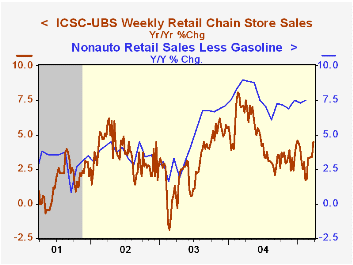 Global| Mar 29 2005
Global| Mar 29 2005Chain Store Sales Crimped By Higher Gas Prices & Inclement Weather
by:Tom Moeller
|in:Economy in Brief
Summary
Chain store sales fell 1.0% last week. Abundant rain, warm temperatures and, versus February, a 12% rise in gasoline prices to an average $2.15 per gallon may have caused the spending decline. The y/y gain in sales improved in part [...]

Chain store sales fell 1.0% last week. Abundant rain, warm temperatures and, versus February, a 12% rise in gasoline prices to an average $2.15 per gallon may have caused the spending decline. The y/y gain in sales improved in part due to the early timing of Easter in 2005.
Consumers' pause came after spending enough to lift the average of sales in March 1.1% ahead of February according to the International Council of Shopping Centers (ICSC)-UBS survey.
During the last ten years there has been a 56% correlation between the y/y change in chain store sales and the change in non-auto retail sales less gasoline, as published by the US Census Department. Chain store sales correspond directly with roughly 14% of nonauto retail sales less gasoline.
The leading indicator of chain store sales from ICSC slipped 0.5% (-0.6% y/y) and gave back all of the moderate gains during the prior two weeks.
The ICSC-UBS retail chain-store sales index is constructed using the same-store sales (stores open for one year) reported by 78 stores of seven retailers: Dayton Hudson, Federated, Kmart, May, J.C. Penney, Sears and Wal-Mart.
Consumer Sentiment, the Economy, and the News Media from the Federal Reserve Board can be found here.
| ICSC-UBS (SA, 1977=100) | 03/26/05 | 03/19/05 | Y/Y | 2004 | 2003 | 2002 |
|---|---|---|---|---|---|---|
| Total Weekly Chain Store Sales | 450.2 | 454.6 | 4.5% | 4.6% | 2.9% | 3.6% |
Tom Moeller
AuthorMore in Author Profile »Prior to joining Haver Analytics in 2000, Mr. Moeller worked as the Economist at Chancellor Capital Management from 1985 to 1999. There, he developed comprehensive economic forecasts and interpreted economic data for equity and fixed income portfolio managers. Also at Chancellor, Mr. Moeller worked as an equity analyst and was responsible for researching and rating companies in the economically sensitive automobile and housing industries for investment in Chancellor’s equity portfolio. Prior to joining Chancellor, Mr. Moeller was an Economist at Citibank from 1979 to 1984. He also analyzed pricing behavior in the metals industry for the Council on Wage and Price Stability in Washington, D.C. In 1999, Mr. Moeller received the award for most accurate forecast from the Forecasters' Club of New York. From 1990 to 1992 he was President of the New York Association for Business Economists. Mr. Moeller earned an M.B.A. in Finance from Fordham University, where he graduated in 1987. He holds a Bachelor of Arts in Economics from George Washington University.






